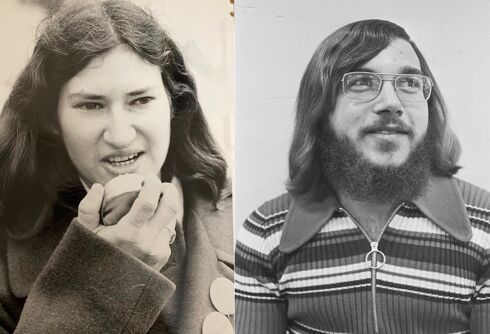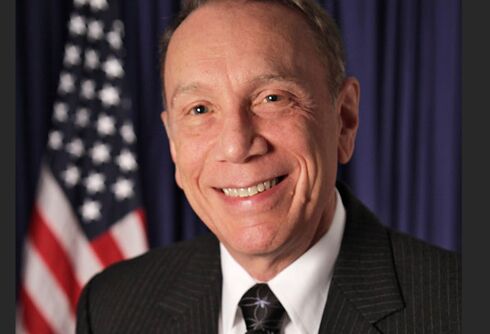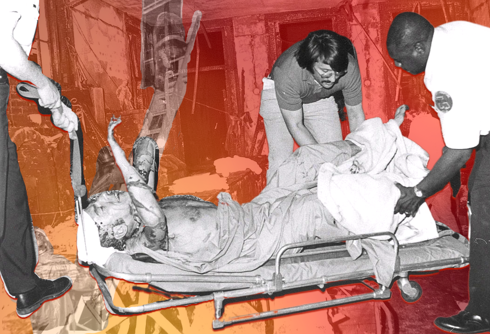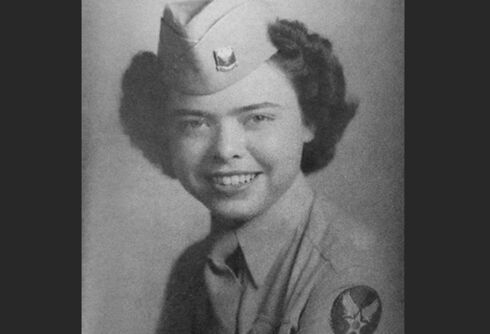In certain corners of the queer internet, you can find earnest tributes to the gay cowboys of 90s country music. Clad in Wrangler jeans and Stetson hats, these men smiled on the covers of self-released CDs and sang songs about lost love and casual sex. They played bars, cruises, and the gay rodeo circuit, and they advertised their music in the backs of gay newspapers.
Artists like Sid Spencer, Steve Lynn and Charlie Pacheo (otherwise known as the “Castro Cowboy”) may not be household names, but they were pioneers in an era when country music was synonymous with (heterosexual) Christian values, long before figures like Orville Peck and Lil Nas X made the queer cowboy aesthetic a marketable force.
Related:
Why are LGBTQ+ folks so drawn to horror films? This queer movie expert has a few ideas.
Queer Cinema Archive’s Derek Le Beau walks us through the genre’s thorny history of LGBTQ+ representation.
These gay cowboys are just one part of country music’s long, queer history. Since the early days of “hillbilly” records and probably long before, queer artists have been adapting country traditions for their purposes and sharing their stories through song. Inspired by the genre’s recent forays into the mainstream, here is a brief history of how queer country music came to be.
Never Miss a Beat
Subscribe to our newsletter to stay ahead of the latest LGBTQ+ political news and insights.
Missing pronouns and double-entendres
Historians have traced the roots of country music at least to the 17th century, but the “big bang” moment for the industry didn’t happen until the 1920s.
In 1927, record producer Ralph Peer traveled from New York City to Bristol, Tennessee to hold recording sessions with “hillbilly” artists from the surrounding areas. The Bristol Sessions, as they came to be known, introduced the world to artists like Jimmie Rodgers and The Carter Family, foundational figures in what we now call country music.
That same year, in New York, an artist named Ewen Hail recorded “Lavender Cowboy,” a story-song about a boyish figure “with only two hairs on his chest” who takes on a group of outlaws and dies a hero’s death. Adapted from a 1923 poem by pulp writer Harold Hersey, “Lavender Cowboy” appeared in the 1930 film Oklahoma Cyclone and has since been covered many times, most notably by Vernon Dalhart in 1939.
A couple years later, the Prairie Ramblers recorded “I Love My Fruit,” a Western swing-style novelty song so ripe with double-entendres that the group recorded it using a pseudonym. Attributed to the Sweet Violet Boys, “I Love My Fruit” is gloriously homoerotic, with lyrics that extol the virtues of (among other things) chewing on banana skin.
While “I Love My Fruit” and “Lavender Cowboy” represent remarkably positive — or at least neutral — depictions of queerness, there soon followed country songs that depicted queerness in a more negative light. Billy Briggs’ “The Sissy Song” from 1951 finds its narrator threatening suicide if he ever gets “sissy enough” to perform activities typically associated with gay men. More disturbing is British singer-songwriter Paddy Roberts’ self-penned update to “Lavender Cowboy” from 1959, which describes its central character as an ineffectual fairy and has him unceremoniously gunned down at the end.
The 1960s saw the emergence of Wilma Burgess, a mainstream star who wasn’t able to be out but also never hid her identity. A protege of prolific producer Owen Bradley — who saw her as a potential successor to Patsy Cline — Burgess insisted on recording songs where the love interest was not referred to by gendered pronouns. When she did occasionally record songs addressed to male lovers, she did so under the agreement with Bradley that her next recording would be a song of her choice. Her songs “Baby” and “Misty Blue” both cracked the top 10, and she still holds the record for the most charted singles by a gay country artist.
Burgess left the country music industry in the late 70s, but she remained active in Nashville’s queer scene, opening one of the city’s first lesbian bars in the early 80s.
Queer country music’s “lost pioneer”
No queer country history would be complete without the story of Patrick Haggerty, the man responsible for what’s widely considered the first openly gay country album, Lavender Country.
Haggerty grew up on a dairy farm in rural Washington, the sixth of ten children born to hard-working parents. Despite growing up in the repressive climate of the 50s, Haggerty has said his father was accepting of his sexuality, which was evident from a young age.
After getting kicked out of the Peace Corps for being gay in 1966, Haggerty decided to devote his life to activism, becoming involved with the Gay Liberation Front. His anger over the injustices of the era became the basis for Lavender Country, the 1973 album that would define his legacy.
The album, which Haggerty recorded with his band of the same name, is scathing and often funny, featuring would-be classics like “Back in the Closet Again” and “Cryin’ These C**ksucking Tears” delivered in a loose, folky style.
With the support of the Gay Community Services of Seattle, 1000 copies of Lavender Country were created, advertised in gay periodicals, and sold at gay bookstores. Despite the limited number of copies, the album attracted a fair amount of attention in the gay underground. “Lavender Country” played at Seattle Pride and other gay events in the region.
The band disbanded in 1976, and Haggerty thought his music career was behind him. A self-described “screaming Marxist b***h,” he became further involved in activist circles, later co-founding the Seattle chapter of ACT UP and running for Seattle City Council and the state House of Representatives as an independent.
Queer country (almost) goes mainstream
If Patrick Haggerty was the first person to record an explicitly gay country album, k.d. lang was the first person to try bringing a queer country sensibility into the mainstream.
A native of Alberta, Canada, with a powerhouse voice, radically short haircut, and camp sense of humor, lang described herself in interviews as the literal reincarnation of her hero, Patsy Cline. lang even worked with Cline’s producer, Owen Bradley, for 1988’s Shadowland, an album of retro-leaning torch songs that found her toning down the honky-tonk humor of her earlier work in favor of a more serious country sound.
lang’s work from this period earned critical acclaim, including Academy of Country Music (ACM) nominations and two Grammy Awards, but she never made serious inroads at country radio.
Despite her obvious country bonafides — she enlisted the help of country legends Kitty Wells, Loretta Lynn, and Brenda Lee for the medley that closes Shadowland — lang never found acceptance in the conservative-leaning Nashville scene. In 1990, she experienced her first taste of backlash after partnering with PETA for their “Meat Stinks” campaign promoting vegetarianism, a cardinal sin for meat-eating country music fans.
She wouldn’t publicly come out until a couple years later, after she had more or less left the country music industry behind, but the writing was on the wall: Country music was not willing to accept a queer person (or a vegetarian, for that matter) into its ranks.
A financially viable proposition
The 1990s saw an explosion in country music’s popularity thanks to acts like Garth Brooks and Shania Twain, who drew from pop and stadium rock for their spellbinding live shows and enormously successful CDs. It was also a boom time for queer country music, though this was happening almost entirely under the radar.
At the center of this scene was Teresa McLaughlin (a trans performer who had not transitioned at the time), a Mississippi native who was inspired to start writing and performing country music after being diagnosed with HIV in the early 1990s. McLaughlin, who at the time was living as a gay man, toured across the country with her “Outband” of gay and lesbian musicians, playing at pride events, college campuses, and gay bars.
In 1998, McLaughlin founded the Lesbian and Gay Country Music Association (LGCMA), an answer to the longstanding Country Music Association (CMA). The group was the subject of “Country Undetectable: Gay Artists in Country Music,” a landmark story by The Journal of Country Music editor Chrissie Dickinson that spotlighted McLaughlin and gay country artists, including Haggerty.
The article designated Haggerty “the lost pioneer of out gay country” and inspired him to connect with McLaughlin. The two toured together from 2001 to 2003, decades after Haggerty’s first go-round but still a few years before a queer country act would become a financially viable proposition.
McLaughlin’s work with the LGCMA also led her to connect with figures like Sid Spencer, a regular on the gay rodeo circuit who specialized in chute dogging, a variation of steer wrestling.
In the 90s, there was significant overlap between the gay rodeo and gay country music scenes, and Spencer released a series of neotraditional country albums before succumbing to complications of AIDS in 1996 at the age of 28. His last album, the posthumously released Chasin’ That Neon Rainbow, is named after a 1990 Alan Jackson song about life as a struggling country singer, a longtime favorite of Spencer’s. The back cover of the CD features a photo of Spencer’s AIDS quilt panel, which is stitched with the title of the song.
Other queer artists relied on the support of left-leaning folk and Americana circles, rather than the country scene. One example is Louisiana native Mary Gauthier, who made a name for herself with her hardscrabble songs about hardscrabble living.
An adoptee who was given up by her biological mother at birth, Gauthier dropped out of high school at 15, battled drug and alcohol addiction and famously spent her 18th birthday in a Kansas City jail cell. The title track of Drags Queens in Limousines, her 1998 album, describes leaving her family as a teenager and finding community with other queer people away from home.
“Sometimes you gotta do what you gotta do / And pray the people you love catch up with you,” she sang.
Rebels in cowboy hats
The commercial country music scene was still reluctant to embrace LGBTQ+ performers throughout the 2000s. There were occasional displays of allyship from major country stars, such as when Willie Nelson and Dolly Parton contributed songs to the Brokeback Mountain and Transamerica soundtracks. Still, there were no significant advances in terms of queer representation in the mainstream.
As for Gauthier, she moved to Nashville in 2001 and signed with Harlan Howard Songs, a publishing company owned by the legendary country music songwriter. Her next two albums, 2002’s Filth and Fire and 2005’s Mercy Now, received broad acclaim for the honesty of her approach and stark poetry of her lyrics, but none of this attention ever translated into country radio play. This despite the fact that her songs have been recorded by the likes of Blake Shelton, Tim McGraw and Kathy Mattea. She was also the first out lesbian to play the Grand Ole Opry.
The arrival of the 2010s brought a series of long-overdue watershed moments for queer country. Chely Wright and Ty Herndon, two mainstream hitmakers who saw chart success in the 90s, came out as gay in 2010 and 2014, respectively. In 2013, newcomer Kacey Musgraves sang cheerily about same-sex affection in “Follow Your Arrow,” a song she co-wrote with gay singer-songwriters Brandy Clark and Shane McAnally, and became one of the first mainstream stars to actively court a queer fanbase.
Also in 2013, gay singer and model Steve Grand went viral with the video for his song “All-American Boy,” with publications quickly proclaiming him the “first openly gay male country singer” (which, of course, was not exactly true). Later in the decade, the all-women supergroups Our Native Daughters and the Highwomen spotlighted queer performers and narratives, and Orville Peck and Lil Nas X made waves in the music and fashion worlds with their iconoclastic takes on queer country aesthetics.
Haggerty found a breakthrough of his own in 2014, when the indie label Bachelors of Paradise reissued Lavender Country. The album quickly ascended to cult classic status, with Pitchfork awarding it “Best New Reissue” and artists including Trixie Mattel and Orville Peck citing Haggerty as a major influence.
The reissue reignited Haggerty’s career, and in the subsequent years he would tour and write songs with the next generation of queer country artists. After Haggerty died of complications from a stroke in 2022, the New York Times ran a lengthy obituary lauding him as a trailblazing artist and activist and describing him – as many of country’s queer artists may see themselves – as an “old rebel in a lavender cowboy hat.”
















